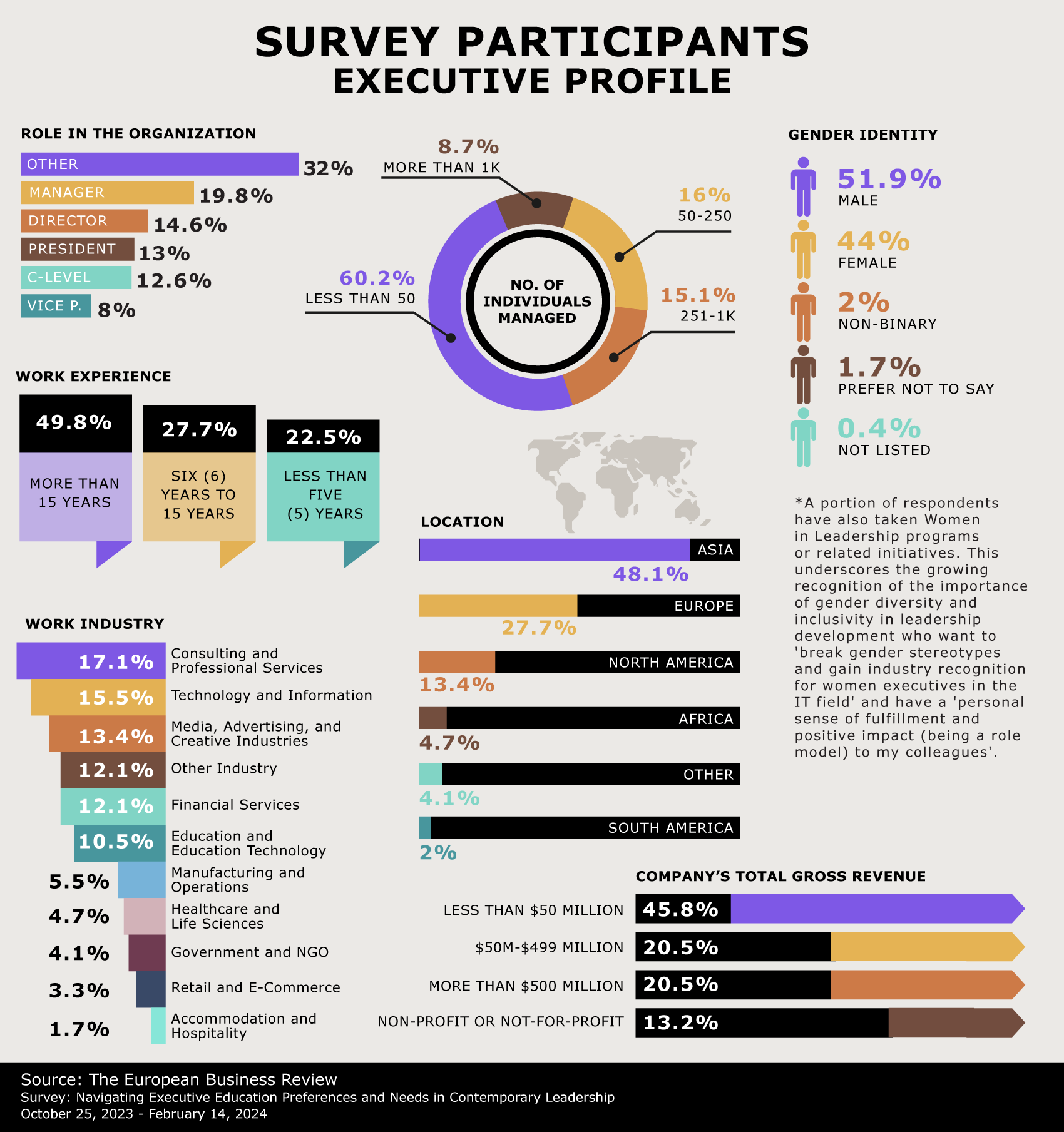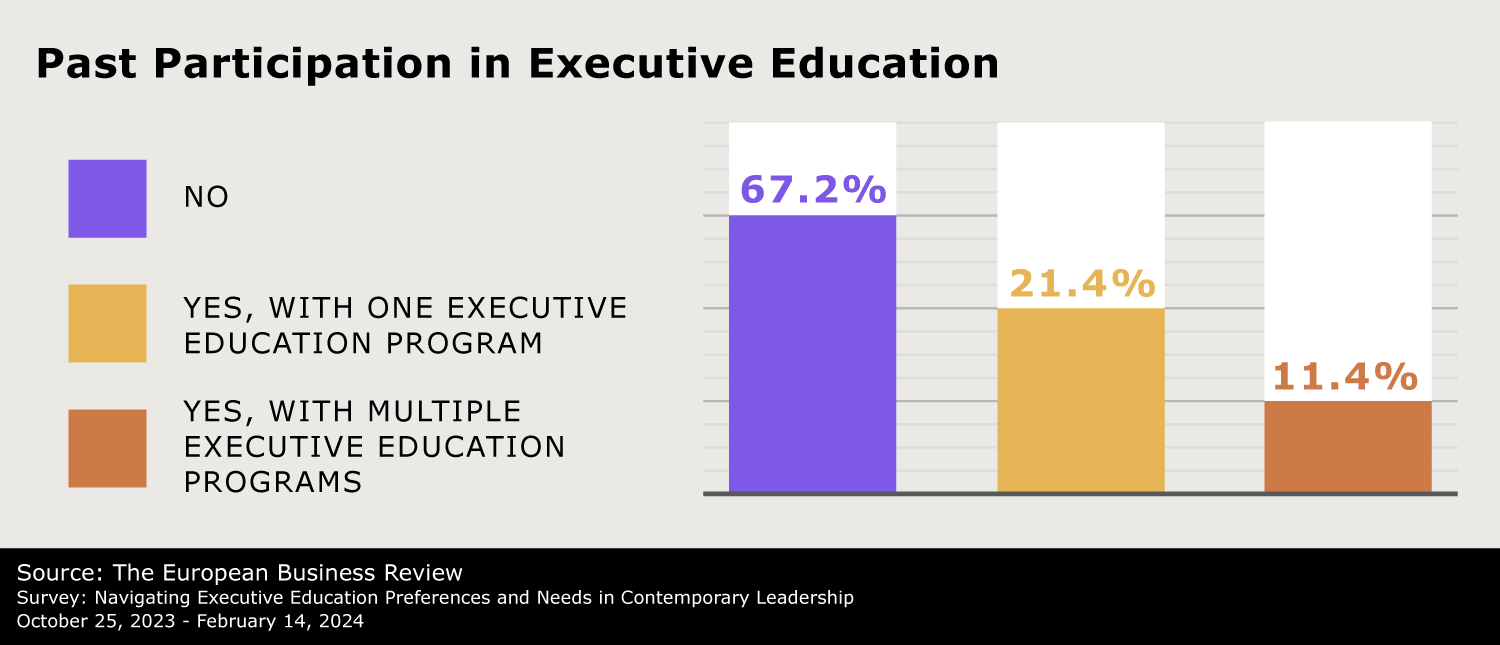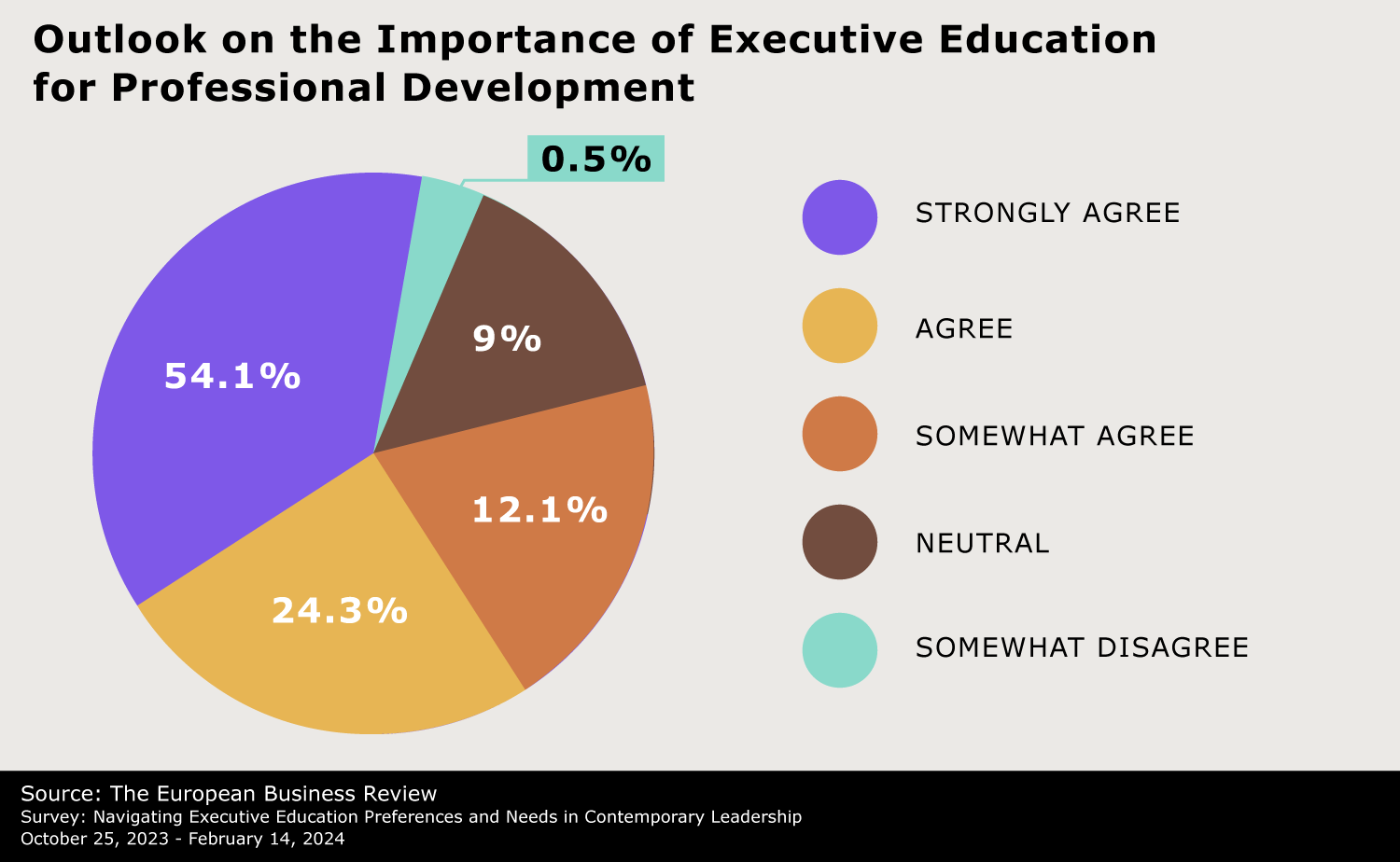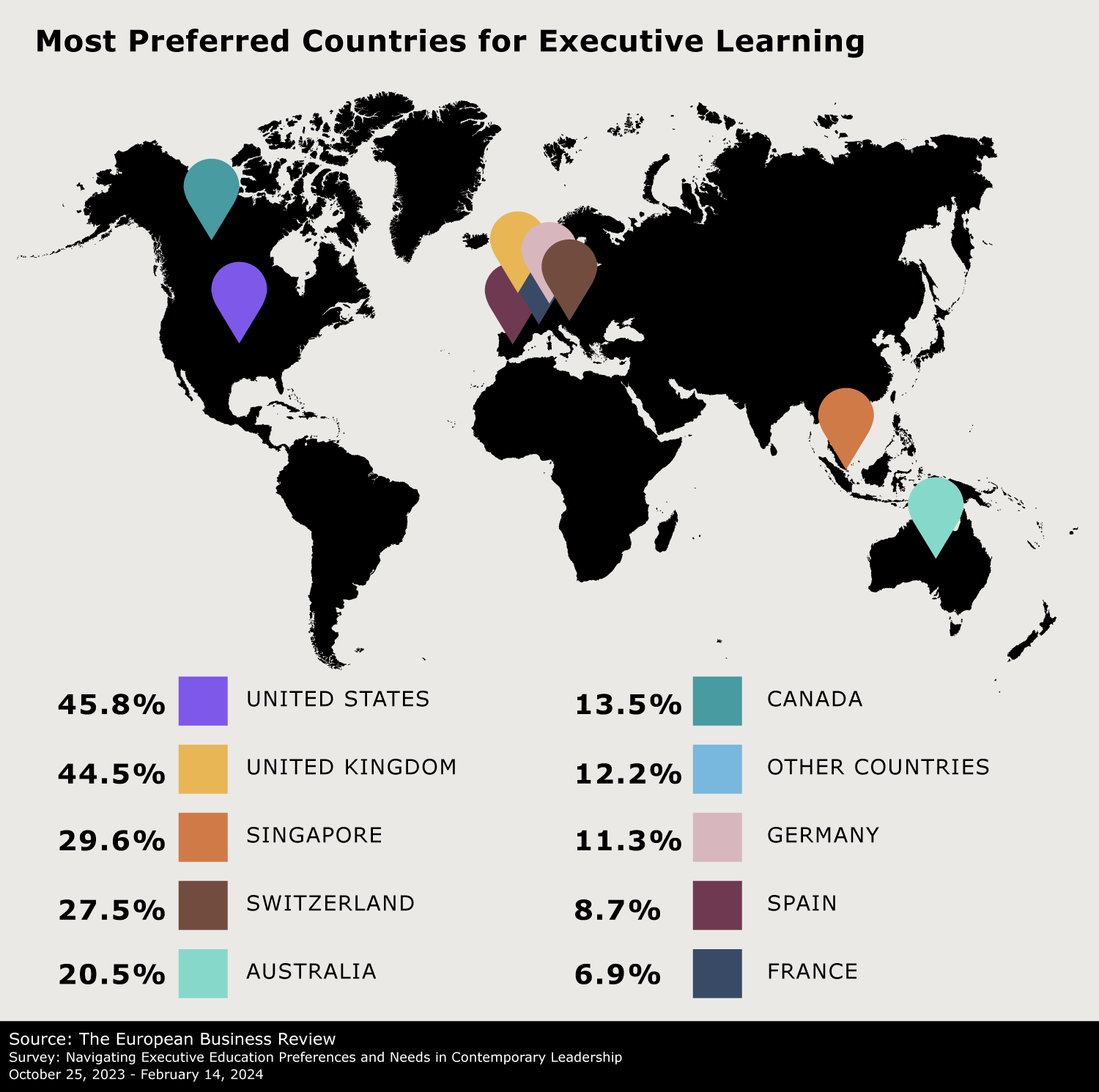By The Editors of The European Business Review
Welcome to the first installment of insights based on the results of our recent survey, “Navigating Executive Education Preferences and Needs in Contemporary Leadership.” Across five meticulously researched articles, we dig deeper into the intricate domain of executive education, guided by the nuanced insights from each section of our comprehensive survey findings.
In this first report, we shed light on the preferred geographical settings for executive education programs and their implications for the broader executive education landscape, uncovering key insights derived directly from the responses of our diverse pool of industry professionals. As we delve deeper into the next reports, every insight, every trend, and every analysis will be rooted firmly in the rich soil of our survey data.
- The survey revealed that the United States (46%), the United Kingdom (41%), and Singapore (33%) are the top choices for executives seeking executive education programs.
- The preferences align with global market projections, underscoring the dominance of established hubs like North America while highlighting the rise of emerging contenders such as Singapore. They have significant implications for the broader landscape of executive education, influencing institutional strategies, program development, and resource allocation.
- The article further explores how executive choices resonate globally, the dynamics shaped by key regions, and the collaborative opportunities within the executive education landscape.
Introduction
The time is now ripe for executives to increasingly turn to executive education programs to hone their skills and stay ahead of the curve. In the rapidly evolving landscape of contemporary leadership, the demand for executive education has never been more pronounced. With a keen understanding of the real concerns and interests of our readers, especially in the field of business and executive education, The European Business Review (TEBR) recognises the importance of staying abreast of evolving trends and challenges faced by professionals in leadership roles.
To unravel the intricacies of executive education preferences and needs, TEBR conducted a comprehensive survey called “Navigating Executive Education Preferences and Needs in Contemporary Leadership”. The survey garnered a total of 318 responses from a diverse array of professionals across industries and roles. By gaining insights into the demographic composition of respondents, including their roles within organizations, gender identity distribution, years of work experience, and industries represented, we aimed to paint a comprehensive picture of the executive education landscape as it is today.
The Executive Education Landscape By the Numbers
Education programs serve as vital conduits for professionals seeking to enhance their skills and knowledge in today’s competitive business environment. Our survey provides valuable insights into the geographical preferences of executives regarding executive education programs.
Respondents highlighted the significance of executive education in advancing their professional capabilities. One participant expressed, “I am anticipating that an executive program would enhance my skills in understanding the trends of managing organizations in the global context and allow me to adapt to unavoidable changes.” This sentiment reflects the proactive approach of professionals in leveraging executive education to stay abreast of industry trends and navigate complex organizational landscapes.
Executives are also now recognizing the transformative potential of executive education in driving personal and professional growth. Another respondent emphasized, “Bringing new opportunities; improving the current professional performance; making it easier to do better (e.g., using new tools, including mental tools).” This acknowledgment underscores the role of executive education in equipping professionals with the tools and perspectives needed to excel in their respective fields.
Let’s delve deeper into the numbers to understand where executives prefer to pursue their educational endeavours:
Where Executives Want to Learn
USA, United Kingdom, and Singapore in the Limelight
-
The United States:
With 46% of respondents expressing a preference for executive education programs in the USA, this country emerges as the top choice among executives. Renowned for its world-class business schools and diverse program offerings, the USA attracts professionals seeking comprehensive and cutting-edge education.
-
The United Kingdom:
Following closely behind, 41% of respondents favor executive education programs in the United Kingdom. The UK’s accessibility to cutting-edge development programs and prestigious institutions makes it an attractive destination for executives looking to enhance their leadership skills and expand their professional networks.

-
Singapore:
Garnering 33% of the preferences, Singapore emerges as a rising star in the executive education landscape. Its strategic location, vibrant business environment, and diverse program offerings make it a compelling choice for executives seeking to gain a competitive edge in the global marketplace.
Comparative Analysis
Executive education programs offered in different regions around the world possess unique strengths and features that attract professionals seeking to advance their careers.
Executive education programs offered in different regions around the world possess unique strengths and features that attract professionals seeking to advance their careers. This section delves into a comparative analysis of the key attributes of executive education in the USA, the United Kingdom, and Singapore, aligns participants’ preferences with global market trends, and explores the broader implications of these preferences on the executive education landscape:
Detailing the Strengths and Unique Features of the USA, United Kingdom, and Singapore
-
The United States:
Home to some of the world’s most renowned business schools, the USA offers a diverse range of executive education programs tailored to meet the needs of professionals at various career stages. Its strengths lie in the breadth and depth of program offerings, access to cutting-edge research and resources, and a robust ecosystem of industry partnerships and networks.
-
The United Kingdom:
Renowned for its prestigious institutions and innovative approach to executive education, the UK provides executives with access to world-class faculty, thought leadership, and industry connections. Its strengths include the accessibility of the latest development programs, emphasis on practical application, and a rich heritage of academic excellence.Dr Jane Ellis-Brush, Director of Teaching for The Bath MBA, elaborates, “The UK shines as a beacon for international business leaders seeking to enrich their learning journey through executive education. Our institutions offer cutting-edge insights, backed up by the latest academic research and thinking, empowering leaders to stay ahead in a rapidly evolving business landscape.”
Dr. Ellis-Brush also mentioned one of the key practices of the UK institutions that further helps executive education participants in growing their professional careers: “Leading UK executive programmes will often partner with real-world business case work, giving professionals access to a vibrant and culturally diverse business ecosystem in which to apply their learning. They will gain insights and hands-on experience within some of the UK’s most notable organisations, enriching their understanding of global business.”
Reflecting on the impact of this collaboration, Dr. Ellis-Brush observes, “On the Bath MBA, we witness how this fusion of applied and research-led knowledge creates a unique learning experience highly valued by our executive students.” -
Singapore:
Emerging as a leading hub for executive education in Asia, Singapore offers a strategic location, diverse program offerings, and a dynamic business environment. Its strengths lie in its multicultural ecosystem, focus on innovation and entrepreneurship, and strategic partnerships with global institutions and corporations.
Aligning Participants’ Preferences with Global Trends Identified in Market Projections
The survey findings align with global market projections, which indicate the dominance of North America, particularly the USA, in the executive education program market. The preferences for the USA, the United Kingdom, and Singapore reflect broader trends in the industry, highlighting the continued appeal of established hubs and the rise of emerging contenders in the global executive education landscape. As executives increasingly prioritize regions known for their academic excellence, innovation, and industry relevance, institutions must adapt their offerings to meet evolving demands and capitalize on emerging opportunities in the executive education market.
Implications of Preferences on the Broader Landscape of Executive Education
The preferences revealed have significant implications for the broader landscape of executive education. They influence institutional strategies, program development, and resource allocation, shaping the competitive dynamics within the industry. As preferences for specific regions continue to evolve, institutions must remain agile and responsive to changing market demands. Collaboration, innovation, and strategic partnerships will be key drivers of success in an increasingly competitive executive education landscape.
Global Impact: Executive Education’s Ripple Effect
These choices not only reflect individual choices but also have a ripple effect that resonates worldwide in the broader executive education community. This section explores how these specific executive choices influence global trends, the dynamics shaped by key regions like the USA, the UK, and Singapore, and the collaborative opportunities and emerging trends within the executive education landscape.
Executive Choices and Their Global Echo
The preferences of executives for specific regions in executive education have far-reaching implications beyond their immediate impact. These choices influence global trends, shaping the competitive landscape and driving innovation and collaboration within the industry. As executives gravitate towards regions known for their academic excellence, industry relevance, and innovation, institutions worldwide are compelled to adapt their offerings to meet evolving demands and capitalize on emerging opportunities.
Dynamics Shaped by USA, UK, and Singapore
The USA, the UK, and Singapore play pivotal roles in shaping the dynamics of the global executive education landscape. The USA’s renowned business schools and diverse program offerings attract professionals from around the world, driving innovation and excellence in executive education.
The UK’s accessibility to cutting-edge development programs and prestigious institutions fosters a culture of learning and collaboration, while Singapore’s strategic location, multicultural ecosystem, and focus on innovation make it a preferred destination for executives seeking to gain a competitive edge in the global marketplace.
Collaborations, Trends, and the Role of Key Regions
The results from the survey underscore the importance of collaboration, innovation, and strategic partnerships within the executive education landscape. Institutions must forge alliances with industry partners, academic institutions, and other stakeholders to remain competitive and relevant in a rapidly evolving environment.
Emerging trends such as online learning, customised programs, and experiential learning are reshaping the executive education landscape, presenting both challenges and opportunities for institutions worldwide. Key regions like the USA, the UK, and Singapore are at the forefront of these trends, driving innovation and setting new standards for excellence in executive education. Collaborative efforts between institutions, industry partners, and other stakeholders will be crucial in shaping executive education’s future and meeting professionals’ evolving needs worldwide.
Conclusion
By understanding the global impact of executive education preferences and the dynamics shaped by key regions, institutions can position themselves strategically to drive innovation, foster collaboration, and meet the evolving needs of professionals worldwide.
The executive education landscape today is continually evolving, with new hotspots emerging and existing ones evolving to meet changing demands. Institutions must remain agile and responsive to shifting preferences and market dynamics, capitalizing on emerging opportunities and forging strategic partnerships to maintain a competitive edge. As preferences for specific regions continue to evolve, institutions must embrace innovation, collaboration, and strategic partnerships to remain relevant and competitive in a rapidly changing environment.
By understanding the global impact of executive education preferences and the dynamics shaped by key regions, institutions can position themselves strategically to drive innovation, foster collaboration, and meet the evolving needs of professionals worldwide.








































